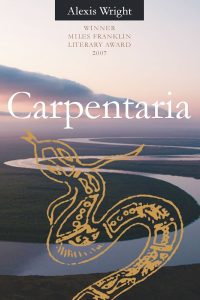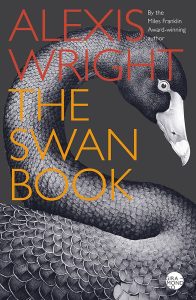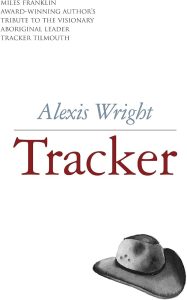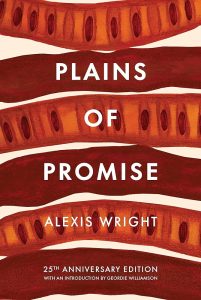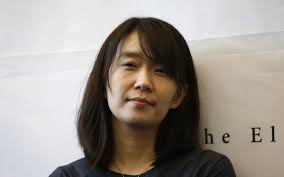The February 2024 Book Box features Praiseworthy, the fourth novel by Aboriginal Australian writer extraordinaire Alexis Wright.
“How can one novel contain so much?” Declan Fry wonders in The Guardian. In another Guardian review of the book, Maya Jaggi describes Praiseworthy as an “incandescent, polyphonic novel–a free-wheeling, circling narrative told by 10 ‘oracles’ … besides Indigenous storytelling, the novel’s vernacular poetry, flights of magic realism and lyrical interiority about internalised hatred nod to other ancestors, from Homer, Joyce, García Márquez and Fuentes to Toni Morrison’s The Bluest Eye.” The New York Times Book Review states: “The layering of time and the riot of language are Wright’s great themes and raw materials, and in Praiseworthy—the most ambitious and accomplished Australian novel of this century—they twist and shimmer, doomed forever to their violent pas de deux”; The Monthly: “An astonishing and monumental masterpiece from the towering Australian writer Alexis Wright, whose words explode from the page.”
Here at Boxwalla, we have been wondering how to do justice to a novel that has been received with such unanimously gushing reviews, but still remains one few have read. The writing, themes, tone, and message of the novel are inextricably tied to its creator, so the best place to start the conversation may be by talking about Alexis Wright: her identity, career, politics, and writing.
Alexis Wright: A Short Biography
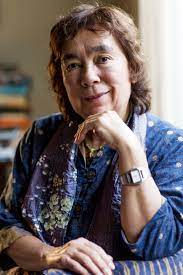 Alexis Wright is a Waanyi writer and activist who has won several awards for her novels, non-fiction, and essays. She is also a vocal advocate for Aboriginal land rights, environmental justice, and cultural preservation. One of the most original and influential voices in contemporary Australian literature, she combines realism, satire, magical realism, and Aboriginal storytelling to create powerful and complex narratives that challenge the dominant views of Australian history and society.
Alexis Wright is a Waanyi writer and activist who has won several awards for her novels, non-fiction, and essays. She is also a vocal advocate for Aboriginal land rights, environmental justice, and cultural preservation. One of the most original and influential voices in contemporary Australian literature, she combines realism, satire, magical realism, and Aboriginal storytelling to create powerful and complex narratives that challenge the dominant views of Australian history and society.
She has worked extensively in government departments and Aboriginal agencies across four Australian states and territories as a professional manager, educator, researcher, and writer. She held the position of Boisbouvier Chair in Australian Literature at the University of Melbourne between 2017–2022. Wright is the first author to have won both the Miles Franklin Award (in 2007 for Carpentaria) and the Stella Prize (in 2018 for Tracker).
The concerns in her writing mirror the struggles, philosophy, and spirituality of the Waanyi people.
The Waanyi Nation
The Waanyi nation is an Aboriginal Australian group that lives in the Gulf of Carpentaria region, in Queensland and the Northern Territory. The essence of Waanyi culture is their relationship with their ancestral lands, which they call Wugujaji. Each element of the environment has its own story of creation and is interconnected with other elements. Today, they number approximately 2,000 people who live predominantly in and around the town of Doomadgee and its surrounding country.
The Waanyi people have a history of resistance and activism against colonization, racism, and environmental destruction. They have fought for their land rights, cultural heritage, and sovereignty.
In 1999, the world’s biggest zinc mine commenced operation in the traditional country of the Waanyi people. The Native Title Act had commenced operation in 1994, with the proposed Century Mine leases representing the first action to be dealt with under the new Act’s arbitration provisions. Native title negotiations surrounding the mine were long, bitter, and acrimonious, with the native title claimants finally approving the Century Mine compensation package in 1997.
Mabo Day in June 1998 marked a further victory in their fight to protect their native title rights and interests. Led by the late Victor Jacob, the Waanyi People from the Bidunggu community were registered as native title claimants of the Gregory River and traditional owners of the area.

Boodjamulla National Park. Photo by ccdoh1, Flickr.
The Waanyi Nation declared its independence to run its own economy on 31 January 2020. In June 2023, more than 79,000 hectares of Boodjamulla National Park was returned to the the Waanyi people in a ceremony at Parliament House in Brisbane. A body of Waanyi representatives will lease the national park land to the state in a first of its kind, becoming Queensland’s first Aboriginal land national park.
Published Works of Alexis Wright
The problems that the Waanyi Nation deals with – climate change, access to natural resources, the effects of colonialism, racism, issues of sovereignty and self-determination, and the question of identity and authenticity – are central to Wright’s literary universe. Her advocacy and writing cannot be separated from each other, as her writing clearly demonstrates:
- Plains of Promise (1997), her first novel, explores the history and trauma of the St Dominic’s Mission in Queensland.
Take Power (1998) is an oral history of the Central Land Council, which represents the Aboriginal people of Central Australia.
Grog War (1997), a study of alcohol abuse and its social and health impacts in Tennant Creek, Northern Territory. - Carpentaria (2006), her most famous novel, which depicts the life and struggles of an Aboriginal community in the Gulf of Carpentaria. It was rejected by every major publisher in Australia, and even when Giramondo published it in 2006, many bookshops were reluctant to promote it. The verdict that it was ”too difficult stylistically” vanished when the book went on to win a number of awards.
- The Swan Book (2013), her third novel, imagines a dystopian future where climate change has devastated the world and Aboriginal people are refugees in their own land.
- Tracker (2018), a collective memoir of the Aboriginal leader Tracker Tilmouth
And finally Praiseworthy (2023), her latest novel, which is set in a fictional Aboriginal town that is engulfed by a mysterious haze and follows the visionary leader Cause and his plan to save his people with feral donkeys.
“It is difficult to encapsulate the full significance of Wright’s works,” writes Tony Hughes-D’aeth in Inside Story, “because it is so far-reaching — cutting across boundaries of time, space and culture — and because it is still emerging. More than anything, her writing introduces into Australian letters a completely new form of thought and speech. In the linguistic universe opened up by Wright’s writing, the reader is made aware of ways of being in the world that are completely distinct from those of capitalist modernity.” To experience her writing fully, you have to read her works, from cover to cover. And Praiseworthy feels like the culmination of all of Wright’s major concerns, her most formidable, inventive, and expansive work yet.
Praiseworthy By Alexis Wright: A Culmination
“We have to think big,” Wright said in an interview over ten years ago. ”We have to imagine big, and that’s part of the problem. We’re letting other people imagine and lead us down what paths they want to take us. Sometimes they’re very limited in the way their ideas are constructed. We need to imagine much more broadly. That’s the work of a writer, and more writers should look at it.” In Praiseworthy, she exceeds this expectation. Everything in the novel feels big, from the length of the sentences to the implications of the story itself. With this novel, Wright ensures that the story of Aboriginal people is told by one of them, and not told for them. But Praiseworthy is also a warning to all of us, living in uncertain and even apocalyptic times, from the descendants of what scientists hypothesize may be the oldest continuous culture on earth (“Who better to teach us the art of endurance than the people she [Wright] calls ‘the world’s greatest human survivors’?”, the article goes on to add.)
Set in the imaginary town of Praiseworthy, where the inhabitants strive to acclimate with their erstwhile colonizers while they ignore the mysterious haze of smoke that envelops their homes, the mistreatment of Australia’s indigenous peoples converge with the global climate crisis. The result is a monumental, living, breathing epic, teeming with possibilities for all of us.
Watch this space for more on the novel. We will post more on Praiseworthy itself, explore some themes in the novel, and also share a list of material related to the book and its Alexis Wright.

